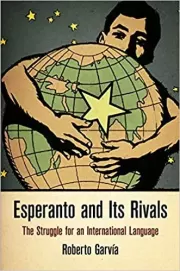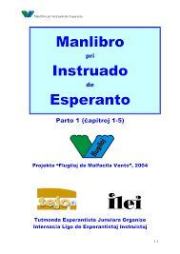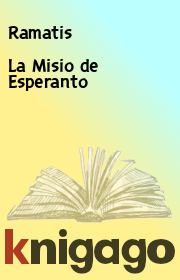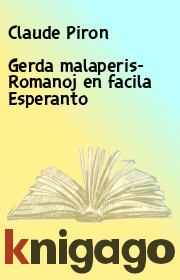Roberto ía - Esperanto and Its Rivals: The Struggle for an International Language
 | Название: | Esperanto and Its Rivals: The Struggle for an International Language |
Автор: | Roberto ía | |
Жанр: | Старинная литература | |
Изадано в серии: | неизвестно | |
Издательство: | неизвестно | |
Год издания: | 2015 | |
ISBN: | неизвестно | |
Отзывы: | Комментировать | |
Рейтинг: | ||
Поделись книгой с друзьями! Помощь сайту: донат на оплату сервера | ||
Краткое содержание книги "Esperanto and Its Rivals: The Struggle for an International Language"
The problems of international communication and linguistic rights are recurring debates in the present-day age of globalization. But the debate truly began over a hundred years ago, when the increasingly interconnected world of the nineteenth century fostered a desire for the development of a global lingua franca. Many individuals and social movements competed to create an artificial language unencumbered by the political rivalries that accompanied English, German, and French. Organizations including the American Philosophical Society, the International Association of Academies, the International Peace Bureau, the Comintern, and the League of Nations intervened in the debate about the possibility of an artificial language, but of the numerous tongues created before World War II, only Esperanto survives today. Esperanto and Its Rivals sheds light on the factors that led almost all artificial languages to fail and helped English to prevail as the global tongue of the twenty-first century. Exploring the social and political contexts of the three most prominent artificial languages—Volapük, Esperanto, and Ido—Roberto Garvía examines the roles played by social movement leaders and inventors, the strategies different organizations used to lobby for each language, and other early decisions that shaped how those languages spread and evolved. Through the rise and fall of these artificial languages, Esperanto and Its Rivals reveals the intellectual dilemmas and political anxieties that troubled the globalizing world at the turn of the twentieth century.
Читаем онлайн "Esperanto and Its Rivals: The Struggle for an International Language". [Страница - 70]
Ecole des hautes etudes commerciales:
Volapŭk courses at, 32 Einstein, Leopold, 47, 71-72 English: in Europe, 165-67, 168; as global language, 3, 15, 38, 155, 164-67; non- native users of, 167; popular promotion of, 8-9; as scientific language, 159-60; vs. Volapŭk, 38 Escuela Moderna, 121 Esperanta Ligilo, 98 La Esperantisto, 72-75 UEsperantiste, 77-78
Esperantists, 95-102; address books of, 68, 72, 76, 78-79, 90; age of, 96, 97; anarchist, 125, 191 n.12; blind, 98, 186-87 n.6; Catalan, 127; Catholic, 115-18; commu- nist, 124-25; Czechoslovakian, 126; education of, 96, 97-98; estimates of, 169 n.5; Flemish, 127; freethinker, 120-22; French, 77-83, 85, 86, 89-90, 107-9; gender of, 96-97, 98; Herderian, 125-28; Ido shift of, 136; International League of, 73-74; Irish, 126-27; Jewish, 76; Nazi, 127-28; occupation of, 96, 97-98; pacifist, 104, 106-11; Protestant, 118-19; recruitment waves of, 98-100; reform-related attrition of, 75; Reuben Tanquist's study of, 95-101; Russian, 59, 75-76, 124-25; socialist, 122-25; social networks of, 101-2, 103-11, 157; Soviet purge of, 59; student, 96, 97; working- class, 122-25 Esperanto, 2; alphabet of, 66; Central Office for, 83, 107; community-building proper- ties of, 67-69, 87-88, 91, 100, 101-2, 154-55, 157; Dua Libro of, 68-69, 70; entertainments in, 86-87; for European Union, 167-68; failure of, 160-61, 163-64; first brochure of, 65-66; First Congress of, 81-83, 84-87; vs. French language, 161, 162; grammar of, 66; Hachette publications on, 79-80; idealistic conception of, 64, 74, 76, 84-86, 89-90, 91, 158, 164; vs. Ido, 142 (see also Ido); international organizations of, 73-74, 82-83; journals for, 72-73, 75, 76, 77-78, 90, 98, 153, 154; League of Nations and, 161-63; learning and use of, 66-68, 99, 100; Lingva Komitato of, 83; national- ism and, 125-28, 161-64; Nazi opposition to, 59, 119; Nuremberg Volapŭkists' shift to, 47, 71-72; pacifism and, 104, 106-11; participatory improvement of, 66-67, 68, 69-70, 73, 74-75; peak popularity of, 151-52; purposes of, 56, 64, 68, 78, 85-86, 100-101; reform of, 74-75, 134, 135 (see also Ido); Rudolf Carnap on, 87-88; for science, 78-79; Second Congress of, 88-90; during Spanish Civil War, 1; spiritualism and, 112-13; teachers of, 98, 186 n.5, 190 n.4; Third Congress of, 120; vs. translation technology, 160-61; Twenty-fifth Congress of, 119; Unua Libro of, 65-66, 71; vegetarianism and, 113-14; vs. Volapŭk, 64, 72, 80, 128; wanderism and, 114-15; words in, 66 Esperanto as an International Auxiliary Language (League of Nations), 162-63 Espero Kataluna, 127 Espero Katolika, 115, 116, 117 Espero Teozofia, 113 Essay Towards a Real Character and a
Philosophical Language (Wilkins), 11 Esterhill, Frank, 194-95 n.15 Eugenics, 109-10
Europe: Babelization of, 7-10; foreign
language instruction in, 16 European Union, 165-66; artificial language
for, 167-68 Examen critique des simplifications qi'ily a introduire dans le Volapuk (Kerckhoffs), 45
Faure, Sebastian, 121 Fechner, Gustav, 113
Feminism: pacifism and, 111
Ferrer, Francisco, 121-22
Fichte, Johann Gottlieb, 14
Filene-Finlay Speech Translator, 160-61
First International, 122
Flammarion, Sylvie, 111
Flandra Esperantisto, 127
Flandra Ligo Esperantista, 127
Folies Bergeres, 35
Forel, Auguste, 108, 109-10
Forschungen zur deutschen Landes- und
Volkskunde, 27 Forster, Peter G., 141 France: antisemitism in, 78; Esperanto in, 77-83, 85, 86, 89-90, 107-9; First Esperanto Congress in, 81-83; 1900 Universal Exposition in, 79; Volapŭk in, 31-32, 34-36 Freethinkers, 120-22
French: Boudon Law on, 166; vs. Esperanto, 161, 162; as language of diplomacy, 15, 16, 31-32; popular promotion of, 8, 9; vs. Volapŭk, 36 Fried, Alfred, 108
Fundamento de Esperanto (Zamenhof), 83
Gender: of Esperantists, 96-97, 98; of Idists,
97, 142; of Volapŭkists, 26 German, 166; as language of science, 15-16, 172-73 n.26; purification of, 126, 127; spelling of, 22; standardization of, 37; vs. Volapŭk, 36-38 German Monistic League, 187 n.1 German Peace Society, 108 Germany: Catholicism in, 37, 53-54, 116-18; Kulturkampf of, 53-54; Volapŭk in, 36-38; youth movements in, 115 Gill, J. Arthur, 114
Globalization: first wave of (1870-1913), 14-17
Godin, Jean-Baptiste, 174-75 n.11 Gordon, Yehuda L., 62 Graddol, David, 167
Grammar: of Esperanto, 66; of Volapŭk, 23,
45, 80-81 Guerard, Albert L., 81, 150, 151 Gulliver's Travels (Swift), 10
Hachette, 79-80 Haeckel, Ernest, 187 n.1
Hahn-Hahn, Countess Ida von, 22
Hamel, Richard, 37
Hartwig, Theodor, 121
Haskalah movement, 60, 61
Haugg, A., 139
Herder, Johann Gottfried, 13
Herderian Esperantists, 125-28
Hidden-world seekers, 112-15
Hinterweltler, 112-15
Histoire de la langue universelle (Leau and
Couturat), 133 Hitler, Adolf, 59, 117
Hochkirchlich-Oekumenischer Bund, 116-17
Homaranists, 186 n.15
Hovevei Zion, 62, 63
Hŭbner, Paul, 118, 119
Hugon, Paul, 139
Human, All Too Human (Nietzsche), 17 Humboldt, Wilhelm von, 13 Huxley, Julian, 150
Ideologues, 12-13 Idiom Neutral, 81, 133, 134, 144 Idists: gender of, 97, 142; Occidental shift of, 145; specialized organizations of, 142, 158 Ido, 2; Academy for, 138, 141, 158; Central Committee for, 138; Esperantist shift to, 136; introduction of, 134-36; journals for, 138, 139, 153, 154, 193-94 n.44; klasika, 140; Ludwig Zamenhof on, 135-36; nonideological character of, 141, 142; original literature in, 140; origin of, 131-35; reform of, 137-40, 141; sociability and, 140-41 Interlingua, 2
Interlingua Institute, 194-95 n.15 Internacia Asocio de Instruistoj, 121 Internacia Esperanto Instituto, 186 n.5 Internacia Katolika Unuiĝo Esperantista
(IKUE), 116-17 Internacia Ligo de Liberpensuloj, 120 Internacia Pedagogia Revuo, 121 Internacia Sciencia Asocio, 107 Internacia Sciencia Revuo, 107 Internacia Socia Revuo, 122 Internacia Societo Esperantista de
Liberpensuloj, 120 Internacia Societo Esperantista por la Paco, 108
Internacio de Socialistaj Esperantistoj, 125
Internacio Katolika (IKa), 117 Internaciona Pioniro, 139 International Association of Academies, 133 International Auxiliary Language
Association, 2, 146-49, 194-95 n.15 International Conference on Bibliography, 106
International Freethought Federation, 120 International Institute for Bibliography, 106 International Language, 139 International Language: Preface and
Complete Grammar (Zamenhof), 65-66 International League of Esperantists, 73-74 International Peace Bureau, 107 International Phonetic Association, 173 n.3 International Research Council, 159 International Vegetarian Union, 114 Ireland: Esperanto in, 126-27
James, William, 113 Jasiewicz, Jules-Michel, 36 Javal, Emile, 77, 83, 86, 88-89, 98 Javal, Leopold, 77 Jenkins, Livingstone, 118 Jensen, L. P., 29
Jespersen, Otto, 2, 133, 136-37, 138-39, 143, 148
Journal de Sgavans, 9
Journals: Esperantist,
--">Книги схожие с «Esperanto and Its Rivals: The Struggle for an International Language» по жанру, серии, автору или названию:
 |
| ILEI - Manlibro-pri-instruado-de-esperanto Жанр: Старинная литература Год издания: 2005 |
 |
| Ramatis - La Misio de Esperanto Жанр: Старинная литература Год издания: 101 |
 |
| Claude Piron - Gerda malaperis- Romanoj en facila Esperanto Жанр: Старинная литература Год издания: 101 |



